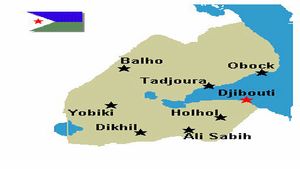President: Ismail Omar Guelleh
Prime Minister: Abdoulkader Kamil Mohamed
Capital: Djibouti
Land area: 21.979 kilometres squared
Population: 774,389 (growth-rate: 2.29%), birth-rate: 15.6/1000, infant mortality rate: 53,53/1000, life expectancy: 61.57
Monetary unit: Djibouti franc
Languages: French and Arabic (both official), Somali and Afar
Ethnicity: Somali 60%, Afar 35% and other 5% including French, arab, Ethiopian and italian.
Literacy rate: 67.9%
Economic summary: GDP/PPP: 2.244 billion, inflation: 7%, unemployment rate: 59% in urban areas and 83% in rural areas
Agriculture: Production of fruits, vegetables; goats, sheep, camels, animal hides. Natural resources like gold and granite are there.
Geography
Djibouti lies in northeast Africa on the Gulf of Aden at the southern entrance to the Red Sea. It borders Ethiopia, Eritrea, and Somalia. The country is the size of Massachusetts and is mainly a stony desert, with scattered plateaus and highlands.
Government
Republic with a unicameral legislature
History
The history of Djibouti, recorded in poetry and songs of its nomadic peoples, goes back thousands of years to a time when Djiboutians traded hides and skins for the perfumes and spices of ancient Egypt, India, and China. Through close contacts with the Arabian Peninsula for more than 1,000 years, the Somali and Afar tribes in this region became the first on the African continent to adopt Islam.
In 1896, Djibouti was named French Somaliland. Djibouti, which has a good natural harbour and ready access to the Ethiopian highlands, attracted trade caravans crossing East Africa as well as Somali settlers from the south. The Franco-Ethiopian railway, linking Djibouti to the heart of Ethiopia, was begun in 1897 and reached Addis Ababa in June 1917, further facilitating the increase of trade.
In early November 1991, civil war erupted in Djibouti between the government and a predominantly Afar rebel group, the Front for the Restoration of Unity and Democracy (FRUD). The FRUD signed a peace accord with the government in December 1994, ending the conflict. Two FRUD members were made cabinet members, and in the presidential elections of 1999 the FRUD campaigned in support of the RPP.
In 1999, Ismail Omar Guelleh--President Hassan Gouled Aptidon's chief of staff, head of security, and key adviser for over 20 years--was elected to the presidency as the RPP candidate.
He received 74% of the vote, with the other 26% going to opposition candidate Moussa Ahmed Idriss, of the Unified Djiboutian Opposition (ODU). For the first time since independence, no group boycotted the election. Moussa Ahmed Idriss and the ODU later challenged the results based on election "irregularities" and the assertion that "foreigners" had voted in various districts of the capital; however, international and locally based observers considered the election to be generally fair, and cited only minor technical difficulties. Ismail Omar Guelleh took the oath of office as the second President of the Republic of Djibouti on May 8, 1999, with the support of an alliance between the RPP and the government-recognized section of the Afar-led FRUD.
In February 2000, another branch of FRUD signed a peace accord with the government. On May 12, 2001, President Ismail Omar Guelleh presided over the signing of what was termed the final peace accord officially ending the decade-long civil war between the government and the armed faction of the FRUD. The peace accord successfully completed the peace process begun on February 7, 2000 in Paris. Ahmed Dini Ahmed represented the FRUD.
In the presidential election held April 8, 2005 Ismail Omar Guelleh was re-elected to a second 6-year term at the head of a multi-party coalition that included the FRUD and other major parties. A loose coalition of opposition parties again boycotted the election. Currently, political power is shared by a Somali president and an Afar prime minister, with an Afar career diplomat as Foreign Minister and other cabinet posts roughly divided. However, Issas are predominating in the government, civil service, and the ruling party. That, together with a shortage of non-government employment, has bred resentment and continued political competition between the Somali Issas and the Afars. In March 2006, Djibouti held its first regional elections and began implementing a decentralization plan. The broad pro-government coalition, including FRUD candidates, again ran unopposed when the government refused to meet opposition preconditions for participation. A nationwide voter registration campaign is now underway in advance of the scheduled 2008 parliamentary elections.
Djibouti has its own armed forces, including a small army, which grew significantly with the start of the civil war in 1991. With the 2001 final peace accord between the government and the Afar-dominated FRUD, the armed forces have been downsized. The country's security is supplemented by a formal security accord with the Government of France, which guarantees Djibouti's territorial integrity against foreign incursions. France maintains one of its largest military bases outside France in Djibouti. There are some 3,000 French troops stationed in Djibouti, including units of the famed French Foreign Legion.
Economy
High unemployment and endemic poverty have heightened social tensions since 2011. The victory of the ruling coalition in parliamentary elections in April 2013 was vigorously challenged by the opposition parties, who won their first-ever seats but boycotted parliamentary sessions in protest against the election results.
The economy’s major focus on maritime goods transport puts Djibouti low down in the global value chain (GVC). Investment in new port facilities will strengthen this sector by taking advantage of specialised activity such as exporting salt, potash and livestock and trade in oil and liquefied gas. Lower factors of production costs will enable short-term expansion to other GVC sectors.
Tourism
The best places to visit on a travel to Djibouti, are the arid expanses of the rocks, the sunken plains and the salty lakes, its ravines, the Suez Canal and the Red Sea. Tourism in Djibouti bases itself on the serene and quite beaches of Djibouti which are the perfect place to unwind and experience the beauty of nature at its best.








